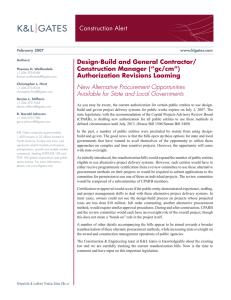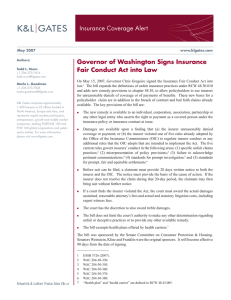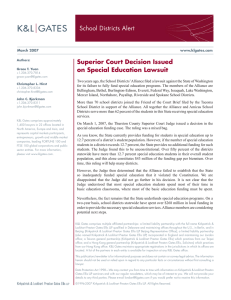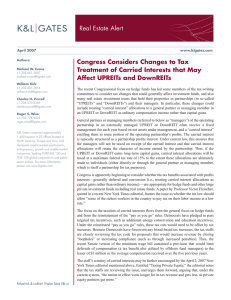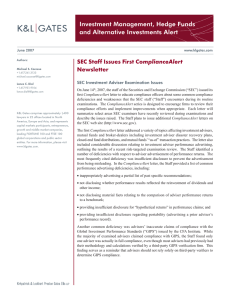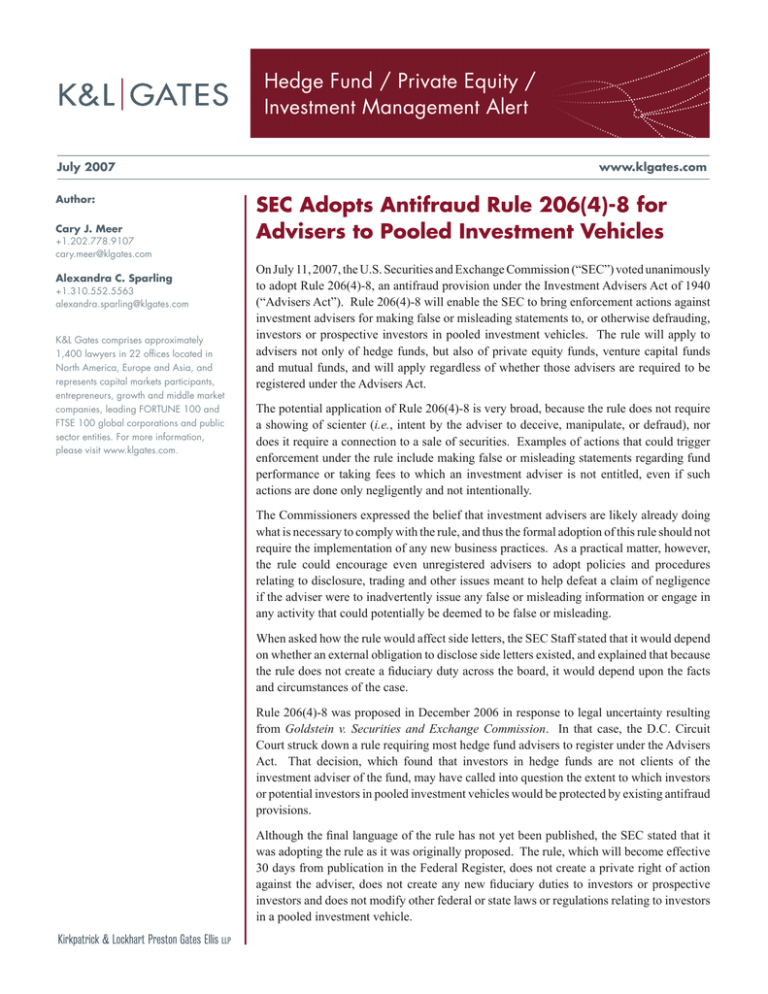
Hedge Fund / Private Equity /
Investment Management Alert
July 2007
Author:
Cary J. Meer
+1.202.778.9107
cary.meer@klgates.com
Alexandra C. Sparling
+1.310.552.5563
alexandra.sparling@klgates.com
K&L Gates comprises approximately
1,400 lawyers in 22 offices located in
North America, Europe and Asia, and
represents capital markets participants,
entrepreneurs, growth and middle market
companies, leading FORTUNE 100 and
FTSE 100 global corporations and public
sector entities. For more information,
please visit www.klgates.com.
www.klgates.com
SEC Adopts Antifraud Rule 206(4)-8 for
Advisers to Pooled Investment Vehicles
On July 11, 2007, the U.S. Securities and Exchange Commission (“SEC”) voted unanimously
to adopt Rule 206(4)-8, an antifraud provision under the Investment Advisers Act of 1940
(“Advisers Act”). Rule 206(4)-8 will enable the SEC to bring enforcement actions against
investment advisers for making false or misleading statements to, or otherwise defrauding,
investors or prospective investors in pooled investment vehicles. The rule will apply to
advisers not only of hedge funds, but also of private equity funds, venture capital funds
and mutual funds, and will apply regardless of whether those advisers are required to be
registered under the Advisers Act.
The potential application of Rule 206(4)-8 is very broad, because the rule does not require
a showing of scienter (i.e., intent by the adviser to deceive, manipulate, or defraud), nor
does it require a connection to a sale of securities. Examples of actions that could trigger
enforcement under the rule include making false or misleading statements regarding fund
performance or taking fees to which an investment adviser is not entitled, even if such
actions are done only negligently and not intentionally.
The Commissioners expressed the belief that investment advisers are likely already doing
what is necessary to comply with the rule, and thus the formal adoption of this rule should not
require the implementation of any new business practices. As a practical matter, however,
the rule could encourage even unregistered advisers to adopt policies and procedures
relating to disclosure, trading and other issues meant to help defeat a claim of negligence
if the adviser were to inadvertently issue any false or misleading information or engage in
any activity that could potentially be deemed to be false or misleading.
When asked how the rule would affect side letters, the SEC Staff stated that it would depend
on whether an external obligation to disclose side letters existed, and explained that because
the rule does not create a fiduciary duty across the board, it would depend upon the facts
and circumstances of the case.
Rule 206(4)-8 was proposed in December 2006 in response to legal uncertainty resulting
from Goldstein v. Securities and Exchange Commission. In that case, the D.C. Circuit
Court struck down a rule requiring most hedge fund advisers to register under the Advisers
Act. That decision, which found that investors in hedge funds are not clients of the
investment adviser of the fund, may have called into question the extent to which investors
or potential investors in pooled investment vehicles would be protected by existing antifraud
provisions.
Although the final language of the rule has not yet been published, the SEC stated that it
was adopting the rule as it was originally proposed. The rule, which will become effective
30 days from publication in the Federal Register, does not create a private right of action
against the adviser, does not create any new fiduciary duties to investors or prospective
investors and does not modify other federal or state laws or regulations relating to investors
in a pooled investment vehicle.
Hedge Fund / Private Equity / Investment Management Alert
When the new antifraud rule was originally proposed,
the SEC additionally proposed the adoption of a new
definition of “accredited investor” that would include
natural persons who meet the current net worth or
income standards specified in Rule 215 or in Rule
501(a) under the Securities Act of 1933, as applicable,
and who, in addition, own at least $2.5 million in
investments, as defined in the proposal. The SEC has
not yet taken final action on that proposed accredited
investor standard.
K&L Gates comprises multiple affiliated partnerships: a limited liability partnership with the full name Kirkpatrick & Lockhart Preston Gates Ellis
LLP qualified in Delaware and maintaining offices throughout the U.S., in Berlin, and in Beijing (Kirkpatrick & Lockhart Preston Gates Ellis LLP
Beijing Representative Office); a limited liability partnership (also named Kirkpatrick & Lockhart Preston Gates Ellis LLP) incorporated in England
and maintaining our London office; a Taiwan general partnership (Kirkpatrick & Lockhart Preston Gates Ellis) which practices from our Taipei
office; and a Hong Kong general partnership (Kirkpatrick & Lockhart Preston Gates Ellis, Solicitors) which practices from our Hong Kong office.
K&L Gates maintains appropriate registrations in the jurisdictions in which its offices are located. A list of the partners in each entity is available
for inspection at any K&L Gates office.
This publication/newsletter is for informational purposes and does not contain or convey legal advice. The information herein should not be used
or relied upon in regard to any particular facts or circumstances without first consulting a lawyer.
Data Protection Act 1998—We may contact you from time to time with information on Kirkpatrick & Lockhart Preston Gates Ellis LLP seminars
and with our regular newsletters, which may be of interest to you. We will not provide your details to any third parties. Please e-mail london@
klgates.com if you would prefer not to receive this information.
©1996-2007 Kirkpatrick & Lockhart Preston Gates Ellis LLP. All Rights Reserved.
July 2007 |

